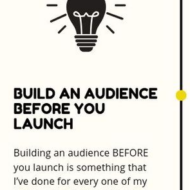Posted by Managementguru in Business Management, Entrepreneurship, How To, Marketing, Project Management, Startups
on Apr 24th, 2019 | 0 comments

Here’s to New Beginnings: Your Essential Guide to Starting a Small Business When you have a great business idea and strive to achieve financial independence, you might be thinking about launching a small business. Every huge corporation started with a small business, so why not? While you can definitely achieve success in the business world, keeping your small business successful for at least 2 to 5 years is a huge work. This game is worth the candle, though. So, if you’re trying to start a small business, here’s your handy guide to help you out: Start your journey with research Perhaps, you’ve already come up with a unique – or any – business idea, but is it going to bring you success? Does your business idea have many competitors? Before you take any step, do your own research. Consider running your idea through a simple validation process that will help you to figure out the future of that idea. First of all, your business idea should offer something – be it a service or a product – that the modern market needs these days. There are many ways to find out if a business idea will be successful, such as focus groups, deep research, and in most cases, trial and error. But before you go through trial and error ask yourself: Does the market need your product/service? Who are the people who will want to use your product/service? What are the companies that offer similar or the same product/service? Will you be able to compete with them? It’s important to ask confidently without any fear or disappointment. Create a business plan Any business idea requires a powerful business plan, which will become your guide during the process of establishment and business growth. There are many types of business plans, so choose the one that will suit your idea. If you’re looking for financial support from a financial institution or an investor, creating a basic business plan is essential. This business plan is usually thorough and long, and contains a set of sections that banks and investors check out when they’re validating a business idea. In case, you’re not looking for any financial support and you’re going to invest in your startup yourself, it may be enough to create a simple and short business plan just to give you the initial steps you should take. You can also come up with a working business plan on a piece of paper and change it as you start working on it. Consider your finances Generally, a startup doesn’t need too many investments, yet you’ll need some money to cover a number of expenses during the first months or even a year before your business will earn a profit. Calculate the one-time startup expenses like property leases, permits and licenses, legal fees, equipment, branding, insurance, inventory, market research, opening events, trademarking, etc. Then, calculate how much money you will need to keep your startup running for a year (your own paycheck, employee paychecks, utilities, rent, advertising, marketing, travel expenses, supplies, etc.) As soon as you find out an approximate amount of money, think about the ways to find them. You can either save money or borrow from family or friends. Many new entrepreneurs also apply for an SBA loan. Filling out an SBA personal financial statement may be tricky, but here’s a guide to help you out. Select a business structure Whether it is a limited liability company (LLC), a partnership, a sole proprietorship, or even a corporation, your next step is to select a business structure. Your business structure will affect a lot of factors, including your liability, business name,...


